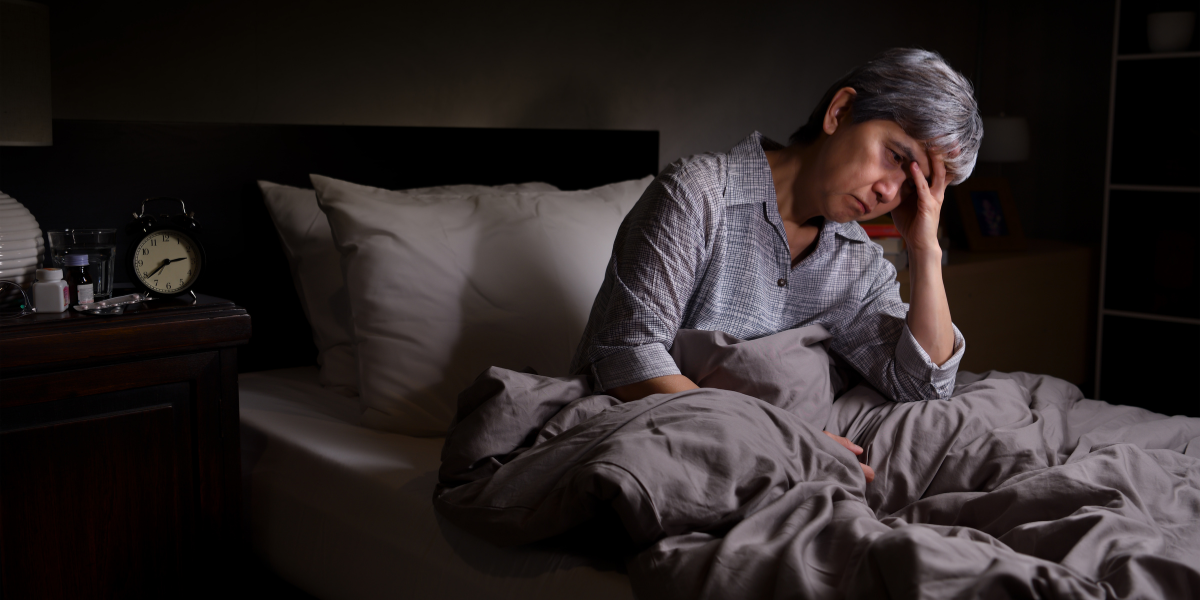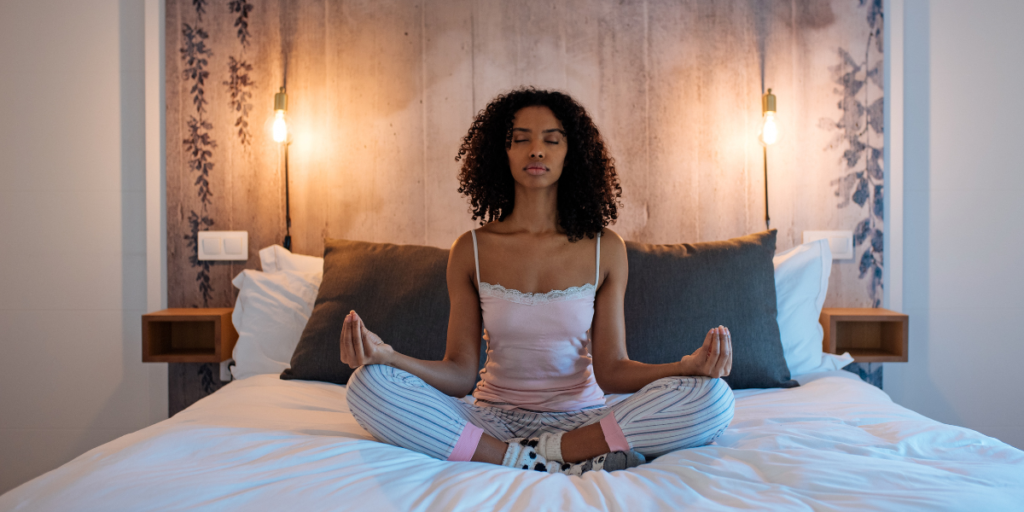Key Takeaways:
- Deep Sleep Essentials: Learn what deep sleep is, why it matters, and how much you really need each night.
- Factors Affecting Deep Sleep: Understand lifestyle, environmental, and health factors that can impact your deep sleep quality.
- Actionable Sleep Tips: Explore practical ways to improve deep sleep, from diet to bedtime routines and beyond.
Have you ever wondered if you’re getting the deep, restorative sleep your body truly needs? While we often focus on the total hours of sleep, it’s the quality of that sleep, especially deep sleep, that can make the real difference between waking up refreshed and feeling groggy. Deep sleep is the phase where our bodies and minds undergo essential repair, building resilience for the day ahead. Yet, with daily stresses, screen time, and unpredictable schedules, achieving enough deep sleep can seem elusive.
At Repose, we understand the importance of quality sleep. We’ve dedicated ourselves to crafting products like our melatonin gummies, designed specifically to support healthy sleep cycles. We believe that everyone deserves a restful night’s sleep without relying on harsh chemicals. Our melatonin gummies offer a natural, gentle approach to promoting sleep, helping you achieve the restorative deep sleep you need to wake up feeling truly refreshed. With Repose, you’re not just getting sleep support—you’re investing in your overall well-being, one peaceful night at a time.
In this article, we’ll explore how much deep sleep you really need each night, the factors that affect it, and actionable tips to help you get the rest your body craves.
Understanding Deep Sleep: What It Is And Why It’s Important
Deep sleep, also known as slow-wave sleep (SWS), is one of the most critical stages of the sleep cycle. It is the phase when the body undergoes intense restorative processes, essential for physical health, brain function, and overall well-being. During deep sleep, blood pressure drops, breathing and heart rate slow down, and the body enters a state of deep relaxation. This stage allows for muscle repair, tissue growth, and immune function strengthening.
In addition to physical recovery, deep sleep is crucial for cognitive health. Studies show that deep sleep helps the brain process and consolidate memories, clear out waste products, and promote emotional resilience. Inadequate deep sleep can lead to issues such as impaired memory, difficulty concentrating, and increased susceptibility to stress.
Ready for a restful night’s sleep? Try Repose Melatonin Gummies and experience natural, deep sleep support. Shop now and wake up refreshed!
The Stages Of Sleep: Where Deep Sleep Fits In
Sleep is divided into several stages, each with a unique role in supporting physical and mental health. These stages fall into two main categories: Non-Rapid Eye Movement (NREM) and Rapid Eye Movement (REM) sleep. NREM sleep is further broken down into three stages, with deep sleep occurring in the third stage.
- Stage 1 (Light Sleep): This is the transition from wakefulness to sleep, a light sleep stage where muscle activity slows, and it’s easy to be woken up. It typically lasts a few minutes.
- Stage 2 (Intermediate Sleep): In this stage, heart rate and body temperature decrease as the body prepares for deeper sleep. Brain activity slows, but short bursts of activity still occur. This stage accounts for a significant portion of the total sleep cycle.
- Stage 3 (Deep Sleep): Also known as slow-wave sleep, this is the deepest and most restorative part of sleep. During deep sleep, the body undergoes essential healing and recovery processes, and brain activity shifts to a slower rhythm, known as delta waves. This stage is harder to wake from and is particularly beneficial for physical restoration and memory processing.
- REM Sleep: After deep sleep, the body cycles into REM sleep, where dreaming often occurs. REM sleep is essential for emotional health and cognitive processing, playing a different but complementary role to deep sleep.
In a typical sleep cycle, the body goes through these stages multiple times, with deep sleep primarily occurring in the first half of the night. As we age, we tend to spend less time in deep sleep, making it even more important to optimize sleep quality for overall health.
How Much Deep Sleep Do You Really Need Each Night?
Deep sleep is a crucial component of a healthy sleep cycle, yet many people wonder how much of it they need to feel fully rested and function optimally. Deep sleep plays a vital role in physical recovery, memory consolidation, and mental clarity, making it especially important for overall well-being. The ideal amount of deep sleep can vary based on age, lifestyle, and individual health needs, but there are general guidelines to help you understand what’s right for you.
Deep Sleep And Its Role In Health
Deep sleep, also known as slow-wave sleep, is the stage in which the body focuses on repair and regeneration. During this phase, cellular repair occurs, and the body releases growth hormones, making it essential for physical health and longevity.
Ideal Deep Sleep Requirements For Adults
For adults, deep sleep should constitute about 15-20% of total sleep time, typically translating to around 1.5 to 2 hours of deep sleep each night. This helps support memory, immune function, and cellular repair, all of which are critical for daily performance and long-term health.
Increased Deep Sleep Needs In Children And Teenagers
Children and teenagers, due to their rapid growth and developmental needs, require more deep sleep than adults. Ideally, they should receive around two to three hours of deep sleep each night to support physical growth, brain development, and learning capabilities.
The Impact Of Age On Deep Sleep Duration
As people age, the body naturally experiences a reduction in deep sleep stages. While older adults may not reach as much deep sleep, it’s still essential to achieve a balanced sleep cycle across all stages to maintain cognitive function, immune health, and general well-being.
Health Implications Of Inadequate Deep Sleep
Insufficient deep sleep can lead to a host of health problems, including reduced mental clarity, memory lapses, and impaired immune function. Over time, consistently missing out on deep sleep may also increase the risk of chronic health issues, affecting overall quality of life.
Strategies To Increase Deep Sleep Quality
To enhance deep sleep, it’s important to maintain good sleep hygiene practices. This includes setting a consistent sleep schedule, avoiding stimulants like caffeine before bed, and creating a relaxing sleep environment. These habits can help you naturally achieve the recommended amount of deep sleep.
Why Deep Sleep Is Only Part Of A Healthy Sleep Cycle
While deep sleep is vital, it’s also just one part of a complete sleep cycle. REM sleep and light sleep stages are equally important for different aspects of health. Achieving a balanced sleep cycle ensures that your body receives the diverse benefits needed for full rejuvenation.
Factors That Affect Deep Sleep Duration
Several factors can influence the amount and quality of deep sleep a person gets each night. Understanding these can help optimize sleep for better health:
- Age: Deep sleep decreases naturally with age. Babies and young children spend much more time in deep sleep, while adults generally have less, and older adults often experience a notable reduction in this sleep stage.
- Sleep Schedule: Maintaining a consistent sleep schedule is essential for maximizing deep sleep. Irregular sleep patterns, such as varying bedtimes or inconsistent wake-up times, can disrupt the body’s internal clock, making it harder to achieve restorative sleep.
- Lifestyle Habits: Physical activity during the day can help promote deep sleep, as exercise has been shown to increase the amount of slow-wave sleep. However, heavy meals, caffeine, and alcohol close to bedtime can interfere with sleep quality and reduce the amount of time spent in deep sleep.
- Sleep Environment: The sleep environment plays a significant role in the quality of deep sleep. A quiet, dark, and cool room helps foster deeper sleep stages. Minimize blue light exposure from screens, as it can suppress melatonin production, making it harder to reach deep sleep.
- Stress Levels: High stress or anxiety can hinder the ability to enter deep sleep. Stress activates the sympathetic nervous system, making it harder to relax fully and achieve the slower brain waves associated with deep sleep. Practicing relaxation techniques, such as meditation or breathing exercises, can be helpful.
- Medical Conditions and Medications: Certain medical conditions, such as sleep apnea, restless legs syndrome, and depression, can impact sleep cycles and reduce deep sleep duration. Additionally, some medications, particularly those for anxiety and depression, can alter sleep architecture, affecting the depth and quality of sleep.
These factors highlight the importance of healthy lifestyle habits and a supportive sleep environment in achieving sufficient deep sleep. Small adjustments in daily routines can lead to significant improvements in deep sleep quality and overall health.
Signs You’re Not Getting Enough Deep Sleep
Deep sleep is essential for maintaining both physical and mental health, and missing out on it can have noticeable effects on your well-being. While feeling occasionally tired may not be cause for concern, chronic signs of insufficient deep sleep can impact everything from energy levels to immune function. Here are some common indicators that you may not be getting the deep sleep your body needs.
Persistent Fatigue Despite Adequate Sleep Hours
If you consistently feel groggy or lethargic even after a full night’s sleep, it may be due to insufficient deep sleep. Deep sleep is the restorative phase that helps your body recover, so missing it can leave you feeling drained and unrefreshed throughout the day.
Memory And Concentration Challenges
Deep sleep is essential for memory consolidation and cognitive processing, so if you’re struggling to retain information or maintain focus, it could indicate a lack of quality sleep. This stage of sleep allows the brain to process and store new information, supporting mental clarity and focus.
Weakening Of The Immune System
Your immune system relies on deep sleep to function effectively, making you more vulnerable to infections and illnesses when you don’t get enough. Regular deep sleep enables your body to repair and strengthen its defenses, while inadequate deep sleep may lead to frequent colds and slower recovery times.
Increased Irritability And Mood Swings
Emotional regulation is closely linked to deep sleep, which helps balance mood and stress levels. Without sufficient deep sleep, you may experience irritability, mood swings, and higher stress, which over time can increase your risk for mental health conditions like anxiety and depression.
Persistent Muscle And Joint Soreness
Since deep sleep is when the body undertakes most of its repair work, inadequate deep sleep can leave you with lingering muscle and joint discomfort. This lack of restoration can make workouts feel harder and delay recovery, affecting physical performance over time.
Frequent Nighttime Awakenings
Regular wake-ups during the night can signal that you’re not achieving deep sleep. These interruptions can prevent the body from cycling through all sleep stages effectively, reducing the quality and duration of deep sleep, often without you fully realizing it.
Tips For Improving Your Deep Sleep Quality
If you’re struggling to get enough deep sleep, there are several effective strategies to help improve its quality. Here are some science-backed tips to maximize deep sleep:
- Establish a Consistent Sleep Routine: Going to bed and waking up at the same time every day, even on weekends, can help regulate your body’s internal clock and make it easier to achieve deeper sleep stages.
- Create a Relaxing Bedtime Routine: Engaging in calming activities before bed, such as reading, meditating, or taking a warm bath, can signal to your body that it’s time to wind down, making it easier to transition into deep sleep.
- Limit Stimulants and Alcohol: Avoid caffeine in the afternoon and evening, as it can disrupt your ability to fall asleep and reach deep sleep stages. Likewise, while alcohol may help you fall asleep initially, it can interfere with the sleep cycle, reducing deep sleep quality.
- Optimize Your Sleep Environment: Aim for a cool, dark, and quiet bedroom to create an ideal sleep environment. Consider blackout curtains, a comfortable mattress, and using earplugs or a white noise machine to minimize disturbances.
- Stay Physically Active: Regular exercise can boost deep sleep, as physical activity helps the body expend energy, making it easier to reach deeper sleep stages. However, try to avoid vigorous exercise close to bedtime, as it may have the opposite effect.
- Try Mindfulness or Meditation Practices: Stress can interfere with sleep quality, especially deep sleep. Practicing mindfulness, deep breathing exercises, or meditation before bed can help reduce stress levels and prepare your mind and body for restful sleep.
- Watch Your Diet: Eating heavy meals close to bedtime can make it harder for your body to relax and enter deep sleep. Opt for lighter snacks if you need to eat before bed, and avoid sugary or high-carb foods that may lead to energy spikes.
- Consider Natural Sleep Supplements: Supplements like melatonin can help support the body’s natural sleep-wake cycle, especially for those with irregular sleep patterns. Melatonin, a hormone naturally produced by the body, signals when it’s time to sleep. Taking a gentle, natural supplement like Repose’s melatonin gummies can encourage a smoother transition to sleep, helping you reach deeper stages more quickly. As with any supplement, consult a healthcare provider to find the right dosage and ensure it complements your sleep goals.
By implementing these habits, you can create a sleep routine that supports deeper, more restorative sleep. Over time, these changes can lead to significant improvements in both physical and mental health.
Final Thoughts
Achieving sufficient deep sleep each night is essential for overall health, supporting everything from immune function to cognitive clarity and emotional resilience. While deep sleep needs may vary by individual, most adults should aim for around 1.5 to 2 hours each night to ensure their bodies and minds are adequately restored.
If you’re experiencing signs of inadequate deep sleep, small adjustments to your daily routine, sleep environment, and lifestyle habits can make a significant difference. Prioritizing sleep quality by focusing on deep sleep can lead to better health, improved productivity, and a greater sense of well-being.
Read also:
- Gummies That Promote Better Sleep Naturally
- How Sleep Aid Gummies Can Improve Your Sleep Quality
- Night Time Gummies to Help You Sleep Peacefully
Frequently Asked Questions About Deep Sleep
What is deep sleep, and how is it different from light sleep?
Deep sleep is a sleep stage where the body undergoes intense physical and mental restoration. Unlike light sleep, which is more easily disrupted, deep sleep involves slow brain waves and a slowed heart rate, allowing for full recovery and memory consolidation.
Can naps help make up for lost deep sleep at night?
Naps may help with overall rest but are unlikely to fully make up for lost deep sleep. Deep sleep primarily occurs during the first part of the night, making consistent nighttime sleep essential.
How does deep sleep affect physical performance?
Deep sleep supports muscle repair, immune function, and hormone regulation, all of which are critical for optimal physical performance and quicker recovery from exercise or injuries.
Does the amount of deep sleep needed change with age?
Yes, children and teenagers require more deep sleep to support growth and development, while adults typically need 1.5-2 hours per night. Older adults may naturally get less deep sleep, but balanced sleep is still vital.
Can diet impact the quality of deep sleep?
Absolutely. Foods high in sugar or caffeine, especially close to bedtime, can disrupt sleep cycles. A balanced diet with sleep-supportive nutrients, like magnesium, may improve sleep quality.
Is it normal to wake up from deep sleep feeling groggy?
Yes, waking up directly from deep sleep can cause sleep inertia, or grogginess, which may last a few minutes to half an hour as your body adjusts to waking.
How can I measure my deep sleep at home?
Many wearable devices, such as fitness trackers and smartwatches, monitor sleep stages, including deep sleep, by tracking heart rate and movement. They offer estimates to help gauge sleep quality.
Are there natural supplements that support deep sleep?
Yes, supplements like melatonin (found in Repose’s melatonin gummies) and magnesium can support a healthy sleep cycle, promoting the likelihood of reaching deeper sleep stages.
What are “sleep cycles,” and how many should I complete in one night?
A full sleep cycle lasts about 90 minutes and includes all stages of sleep, including deep sleep and REM. Ideally, adults should complete four to six sleep cycles each night for restorative rest.
Does exercising late in the day impact deep sleep?
Vigorous exercise close to bedtime can raise heart rate and delay sleep onset, possibly affecting deep sleep. Exercise earlier in the day generally supports better sleep quality.
Sources:
- Fattinger, S., de Beukelaar, T. T., Ruddy, K. L., Volk, C., Heyse, N. C., Herbst, J. A., Hahnloser, R. H. R., Wenderoth, N., & Huber, R. (2017). Deep sleep maintains learning efficiency of the human brain. Nature Communications, 8(1), 15405. https://doi.org/10.1038/ncomms15405
- Ferrara, M., & De Gennaro, L. (2001). How much sleep do we need? Sleep Medicine Reviews, 5(2), 155–179. https://doi.org/10.1053/smrv.2000.0138
- Should We be Taking More Sleep? (1995). Sleep. https://doi.org/10.1093/sleep/18.10.901a
- Ohlmann, K. K., O’Sullivan, M. I., Berryman, P., & Lukes, E. (2009). The Costs of Short Sleep. AAOHN Journal, 57(9), 381–387. https://doi.org/10.1177/216507990905700905
- The Science of Deep Sleep, Towards Success. (2023). Google Books. https://books.google.com/books?hl=en&lr=&id=mxvREAAAQBAJ&oi=fnd&pg=PT4&dq=benefits+of+having+enough+deep+sleep+each+night&ots=AVl2xd6NeH&sig=5zjE9-4mUU_8zyMkr3i92gG8iZA










